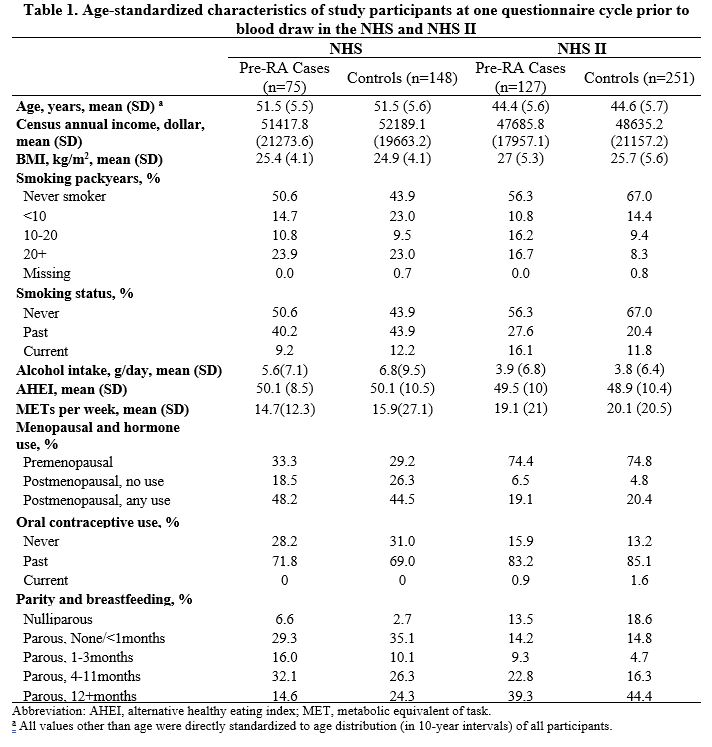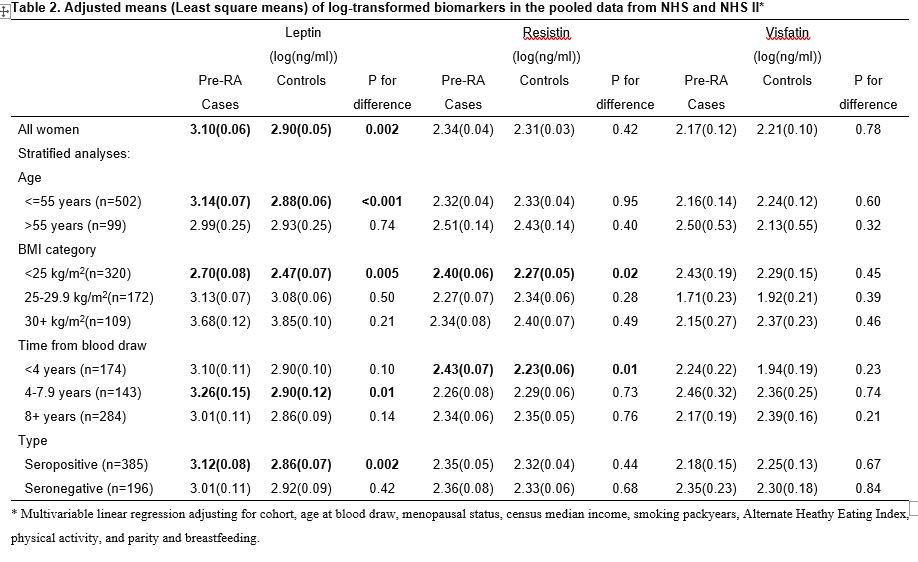Session Information
Date: Sunday, November 7, 2021
Title: Epidemiology & Public Health Poster II: Inflammatory Arthritis – RA, SpA, & Gout (0560–0593)
Session Type: Poster Session B
Session Time: 8:30AM-10:30AM
Background/Purpose: Adipokines secreted by adipose tissues thought to be involved in RA pathogenesis by stimulating systematic inflammation. We examined the association between circulating adipokines (leptin, visfatin and resistin) and risk of developing RA in women.
Methods: We conducted a nested case-control study within the Nurses’ Health Study and Nurses’ Health Study II among 202 incident RA cases with a preclinical blood sample and 399 controls (~1:2) who were free of RA at the time of diagnosis of index case, and matched on age, ethnicity, fasting status, time of day of blood draw, and menopausal status /hormone use. All covariates were measured before blood draw. Adipokine biomarkers were log-transformed to improve normality. Multivariable linear regression models adjusted for matching factors and other potential confounders were used to examine the differences in adjusted means of circulating leptin, visfatin, and resistin between pre-clinical RA cases and controls. We examined strata defined by age at RA diagnosis, BMI, time between blood draw and RA (0-3.9, 4-< 7.9 and >8 years), and RA seropositivity (rheumatoid factor and/or anti-cyclic citrullinated peptide).
Results: Characteristics of the pre-RA cases and controls are shown in Table 1. After adjusting for matching factors and other risk factors, pre-clinical RA cases had a significantly higher level of leptin compared with controls (p=0.002) (Table 2). No significant differences were observed in levels of visfatin and resistin between all pre-clinical RA cases and controls. In stratified analyses for leptin, significant associations were found among women aged 55 years or less, women who had BMI < 25 kg/m2 at the date of blood draw, and those who underwent blood draw 4-7.9 years before RA diagnosis or matched controls. Similarly, seropositive cases but not seronegative cases, had a higher level of leptin compared to controls. A significant difference in resistin level was also observed among women with BMI< 25 kg/m2 and who underwent blood draw < 4 years before diagnosis vs. controls. In exploratory analyses, among both cases and controls, a higher level of leptin was significantly associated with higher levels of inflammatory markers [monocyte chemoattractant protein–1 (MCP-1), IL6, and tumor necrosis factor receptor 2 (TNFR2)] (Table 3).
Conclusion: Circulating level of leptin was higher in women with preclinical RA than in controls. These results indicated that adipokines secreted by adipose tissues may be involved in RA pathogenesis. The screening for leptin could be used to identify high risk groups to prevent RA.
To cite this abstract in AMA style:
Fang Z, Cui J, Sparks J, Malspeis S, Yoshida K, Costenbader K, Karlson E, Lu B. Circulating Adipokines and Risk of Rheumatoid Arthritis in Women [abstract]. Arthritis Rheumatol. 2021; 73 (suppl 9). https://acrabstracts.org/abstract/circulating-adipokines-and-risk-of-rheumatoid-arthritis-in-women/. Accessed .« Back to ACR Convergence 2021
ACR Meeting Abstracts - https://acrabstracts.org/abstract/circulating-adipokines-and-risk-of-rheumatoid-arthritis-in-women/



